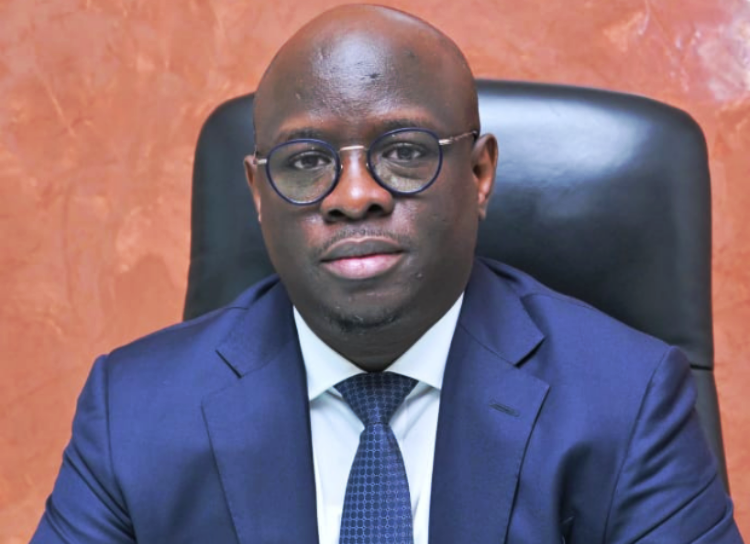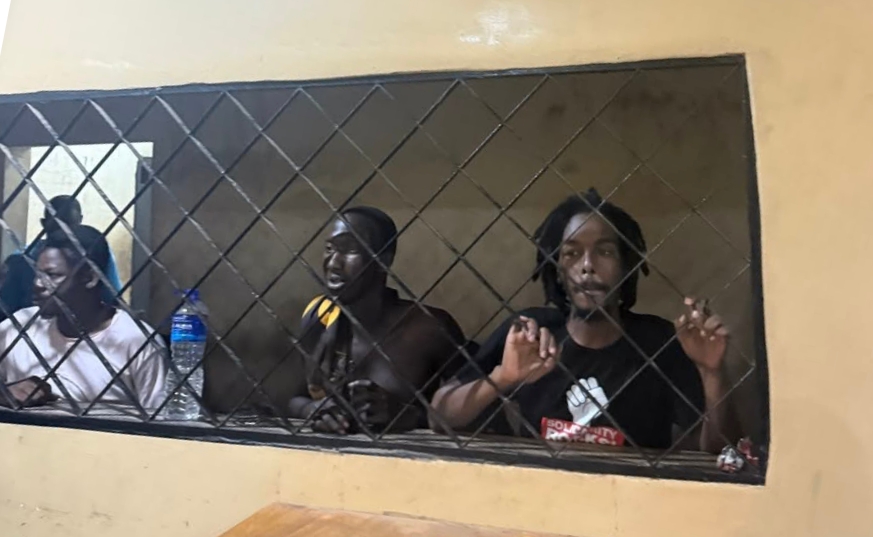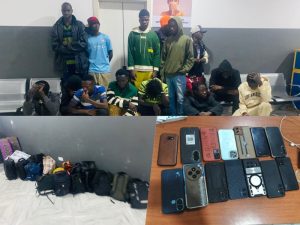Gambiaj.com – (BANJUL, The Gambia) – Tensions remain high in The Gambia following the arrest of over 20 anti-corruption activists linked to an unauthorized protest organized by the youth-led group Gambians Against Looted Assets (GALA). The protest, which was denied a police permit, aimed to demand accountability over the country’s looted assets by former President Yahya Jammeh, and the release of names tied to their sale.
The Gambia Police Force (GPF) confirmed the arrests, stating that the protesters defied an official ban on the gathering. On Friday morning, police officers were deployed to Westfield in anticipation of a renewed demonstration by young Gambians calling for the release of their detained peers and greater transparency from the government.
According to authorities, the arrested individuals are being held at the Banjul Police Station and have refused to disclose their identities during interrogation.
However, civil society sources report that detainees have been transferred to multiple locations, including police stations in Brikama, Old Yundum, Brusubi, Jabang, Tanji, and the Police Intervention Unit (PIU) in Kanifing.
Eyewitnesses and human rights advocates allege that the transfers are part of a psychological tactic to disorient and intimidate the detainees.
“This is a mind game,” said a GALA member. “They’re trying to silence us through fear and confusion—but no retreat, no surrender.”
Prominent rights advocate Madi Jobarteh of the Edward Francis Small Centre for Rights and Justice (EFSCRJ) compared the crackdown to practices under former President Yahya Jammeh.
“Jammeh tactics—detention incommunicado. That’s how people disappeared or were killed under the dictatorship. And now, in 2025, it’s happening again,” he warned.
In a public message to the police command, Jobarteh reminded law enforcement that arbitrary arrest, enforced disappearances, and incommunicado detention are unconstitutional in The Gambia.
“We remind the Gambia Police about our laws prohibiting arbitrary detention, torture, and degrading treatment. Uphold the law,” he urged.
The arrests have drawn widespread condemnation from civil society groups, human rights organizations, and media bodies. The Gambia Press Union (GPU) issued a statement urging the police to respect journalists’ rights during protests.
“The GPU calls on the police to refrain from any acts of violence or intimidation against journalists, especially when covering peaceful protests,” said GPU Secretary General Modou S. Joof.
Marr Nyang, Executive Director of Gambia Participates, criticized what he called a systemic denial of permits for anti-corruption protests. In a social media post, he listed a series of rejections from 2020 to 2025, contrasting them with a recent protest—permitted and protected by police—against a judicial salary increase.
“Be your own judge,” Nyang wrote.
The Solo Sandeng Foundation also weighed in, invoking the memory of the late pro-democracy activist Solo Sandeng, who died in police custody in 2016 after a peaceful protest.
“A decade after his brutal death, young people are still being arrested for exercising the very rights he died defending. This is both disturbing and unacceptable,” the foundation stated. It called for the immediate and unconditional release of all detained protesters and urged the government to disclose the names of individuals who purchased Jammeh-era assets.
Youth activist Kemo Fatty urged supporters to continue gathering at Westfield in solidarity with GALA members.
“We call on all young people who believe in democracy and the rule of law to come to Westfield—the place they fear,” Fatty declared. “We are not taking ‘no’ for an answer.”
Popular Gambian artist Hussain Dada also expressed support, writing on social media: “Free dem boys NOW!!!!!! They have every right to demonstrate peacefully.”
As public pressure mounts, civil society organizations are bracing for further developments. The government now faces growing scrutiny over its handling of the protest and broader concerns about civil liberties, the right to peaceful assembly, and the lingering shadow of authoritarian-era tactics.










